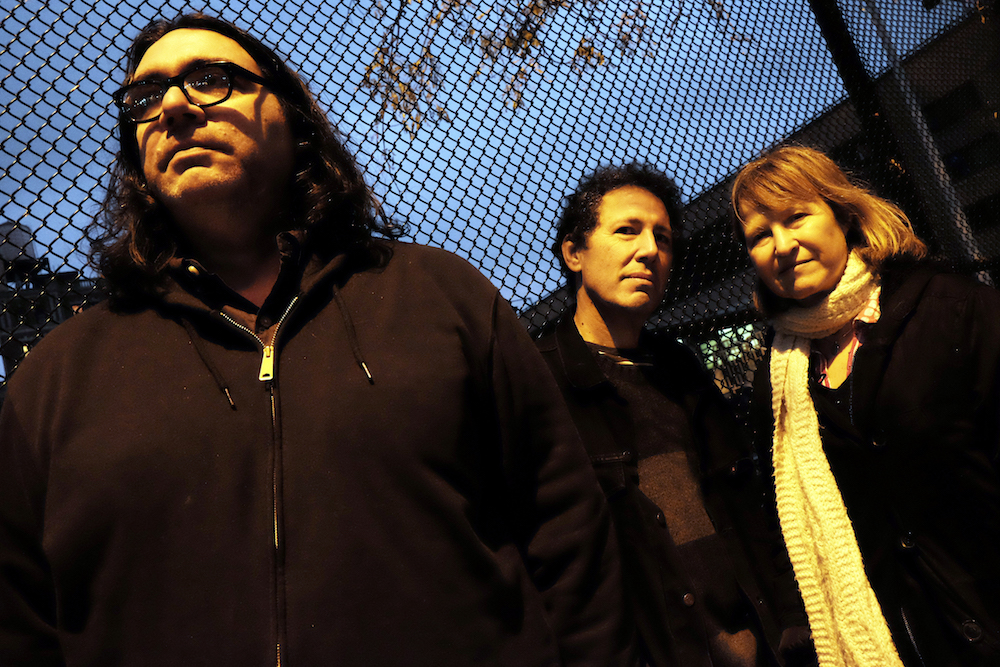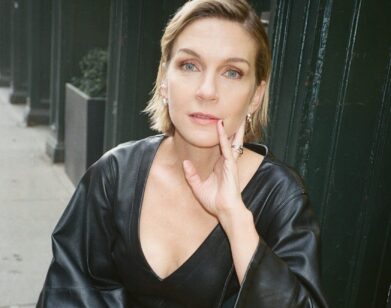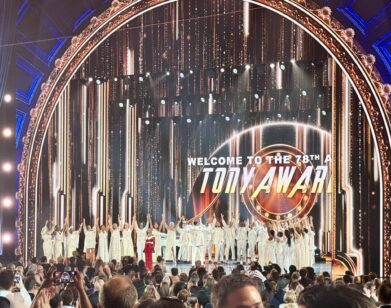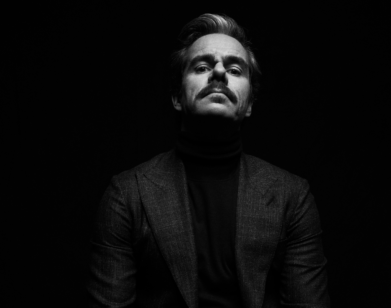Indie rockers Yo La Tengo talk rioting with Better Call Saul’s Bob Odenkirk

PHOTOGRAPHY BY GODLIS
Indie institution Yo La Tengo are gearing up to release a new album called There’s a Riot Going On later this month. The trio—bassist James McNew, drummer Georgia Hubley, and her husband Ira Kaplan, the band’s lead singer—have spent the last three decades quietly establishing themselves as one of America’s foremost rock bands. Across their deep catalog they’ve toyed with everything from noise pop to shoegaze, anchored by the wry lyrical perspective that’s made them timeless slacker heroes. On the new record, their 15th, the band are fired up. Their latest song “For You Too” addresses the effect of contemporary political instability on our personal lives.
“For you / Whenever there’s hurt / And things are uncertain / Maybe I could be that guy / I’d like to try,” Kaplan sings.
Over the last three decades, the band have developed friendships with several icons of American alt-comedy. This includes Bob Odenkirk, who made his name in the ’90s as co-creator (with David Cross) of the sketch comedy series Mr. Show, and more recently as the wheedling lawyer in Breaking Bad and its spinoff, AMC’s Better Call Saul. In 1997, Odenkirk and Cross starred in Yo La Tengo’s goofy video for “Sugarcube,” where they dressed up as hair metal stars and taught the trio how to rock.
The friendship continues to this day; last December, Odenkirk made an appearance at the band’s Hannukah show at Bowery Ballroom, and a few weeks back they hopped on the phone to chat street riots, comedy and clearing out venues through rebellious noise.
BOB ODENKIRK: You guys are keeping my New York spirit alive and yet I don’t feel like you are doing anything throwback at all. I guess they just don’t make bands like this anymore. [laughs] Or am I just not looking in the right places?
IRA KAPLAN: I feel like so much of it is just a function of age. I’m always hesitant to be like, “Oh, things are this situation. This climate is bad, the scene is bad, New York is dead.” You know, any of those sweeping pronouncements. I think they’re all synonymous with, “I am old.”
ODENKIRK: I agree. I think the experimental nature of your output over time, even though I can identify a Yo La Tengo sound, is pretty rare with bands. I think people find their groove and they just can’t leave it. You guys are still challenging yourselves and making really intense choices. Do you think you challenge yourselves more than other bands?
KAPLAN: I’m not going to speak to other groups, but we’re lucky. The three of us found each other and we can do that without irritating somebody in the band and without somebody in the band mocking. If somebody overreaches, and we do that all the time, nobody’s going to cut off your legs. It’s just something we like doing.
ODENKIRK: I think about you guys and I think about [comedian] David Cross—we proceed forward with the next thing that is most intriguing to us, without any sense of the commercial possibilities. We’re just trying to do the next good thing that most intrigues us.
KAPLAN: We get asked all the time about thinking about the audience. Pretty honestly, not entirely honestly, we don’t think about them very much. If we like it we’re hopeful [the audience will as well], but there’s going to be at least a couple other people who will and we take it from there.
ODENKIRK: Yeah, we are our own audience. I remember making Mr. Show thinking, “Man this stuff is really funny to me.” I don’t know if anyone else will love it but I know I’m going to still watch it in 15 years if I’m still alive and laugh really hard. Even though we had very high standard, we were trying to excite and please ourselves. That was the main goal and it kind of still is.
KAPLAN: Something that I’ve been thinking about a lot lately—getting older—is time going away, and that opportunities that arise may not come back again. And even if it’s inconvenient in the moment to seize on that opportunity, this may be your last chance to do this specific thing. Isn’t that a big part of what you go through?
ODENKIRK: Yeah, there’s got to be a balance between these two drives here. For this album, how long did you sit on that music that was recorded and you wanted to share with people?
KAPLAN: I don’t remember. We were just recording in our practice space. We had gotten some new pedal and we plugged it in and instantly something came out that sounded hilarious to us, so we just played along with this loop we made for like an hour and were like, “Okay, that was a good day of getting together.” It’s funny. We did really like it but if no one else never heard it, it wouldn’t have mattered.
ODENKIRK: But that’s a healthy outlook on your work. You make you work for yourself. It’s the feeling of, “If nobody ever saw it, that’d be fine too.” You can really feel that way, instead of feeling pressured like, “I got to get this out there.” I’m looking at some of these projects and I really think there’s great promise in them, they’re really amazing. I did one show called Highway to Oblivion, which was a half-hour comedy compiled like an E! True Hollywood Story about this guy played by Howard Kremer who was crashing on different celebrities’ couches and wrecking their lives because that’s just the kind of guy that he is.
It was great, but it was just incomplete, so it didn’t get traction at the network. I think if we’d been more patient with it, we’d have made that wonderful show. But you try to learn a lesson from your career and you don’t always learn the right ones; you’re probably off the mark half the time. Nobody knows anything, right? You just moved into New York recently, right?
KAPLAN: Yeah. Georgia [Hubley] grew up in New York. We always felt like New Yorkers who lived in Hoboken, even though we lived in Hoboken for a long time. We’re very happy to be here. Challenging traffic on my bicycle every day, that’s a good feeling. The bike riding’s a little trickier than in Hoboken.
ODENKIRK: But it keeps you on your toes. It’s good for your brain I think, as long as you don’t get hit by a car. What’s the name of your new album?
KAPLAN: There’s a Riot Going On.
ODENKIRK: There’s a Riot Going On. And this is actually the name of an old album. I remember when I heard the name I was like, “Wasn’t there an album named that already?”
KAPLAN: I’m happy to find out that the title is either vaguely familiar or unknown to some people. It’s obviously chosen with an awareness of its previous use but we would not have stuck with it if we thought it was dependent on knowing its provenance.
ODENKIRK: When I hear the title, which I love by the way, I can only say I wish there was a riot going on. There’s a bitch session going on, but not a riot.
KAPLAN: There are a lot of things I miss about the riot era but I can’t go as far as to say that I wish the streets were in flames. I am curious sometimes why they’re not I guess, but I’m not sure I want it.
ODENKIRK: I do, but I also want everyone to listen to each other. I’d like both. It’s weird, obviously New York has changed so much since you guys started playing there, and yet somehow don’t you think the spirit of New York is alive?
KAPLAN: There’s always things to do. I spend a lot more time in Brooklyn than I ever did before, so it changes. Manhattan’s not the epicenter the way it was then. But I don’t know, I’m always suspicious of people my age looking down on the current world. It seems like people are still coming here, so it must have something to offer.
ODENKIRK: I went to New York in ’87 to write for Saturday Night Live. I lived just off Washington Square Park, and obviously Soho was just starting to come up around that time and it’s really just gone through the roof with how expensive everything is. But I think I’m more amazed at how much I still feel the energy and excitement and edge that was there. You can’t get rid of it. I’m an old guy too, but I’m more amazed at how positive and exciting it still feels.
KAPLAN: I think so too.
ODENKIRK: You guys put on a helluva show. You’re never totally out of practice right? You guys are always doing live shows.
KAPLAN: Not really.
ODENKIRK: You take breaks?
KAPLAN: Well, we’re always working, but we have an elastic concept of what it means to be ready and rehearsed. Over the years we’ve gotten more confident in screwing things up and just hoping the emotion and the spirit will make up for whatever technical problems there are.
ODENKIRK: You guys together on stage is really a living thing, a real event. I have to say there’s a similarity to David [Cross] and I connecting on stage.
KAPLAN: I was just going to say that. On the flip side of that, there has to be an awareness that you have, that there’s something uniquely special about when you’re together. And you can take advantage of that to do something that’s maybe not perfectly formed.
ODENKIRK: It’s really true. Are you guys going on tour soon?
KAPLAN: We are. The record comes out in the middle of March. At the end of March we start touring for it. So we’re hard at work trying to figure out how the songs actually go, which is very different from recording them.
ODENKIRK: The lyrics are very beautiful and they’re very sad and sweet. Are they different from the writing you’ve done on other albums?
KAPLAN: The approach wasn’t that different. I’m happy you said sad. I think the positivity is that we’re here. We’re just going to find a way to make it through difficult times and that, in itself, is positive. But some of that can be acknowledging and not hiding from your sadness or your fear. So there’s a lot of sadness, but I think there’s something really joyful in expressing that sadness.
ODENKIRK: There’s a beauty and hope in it. They feel very much about a relationship. There’s a hope and a sweetness in them that juxtaposes a little with the sounds that you guys make. Do you write the lyrics first or do you mess around with melodies?
KAPLAN: The lyrics are written because they have to be. We write the songs, sing the songs a lot without having finished words, and generally even record the songs before. It’s only when there’s nothing left to do that somebody sits down and writes the words. I write most of them, but not all of them. But it’s not a part of the process that any of us look forward to.
ODENKIRK: Well, they’re beautiful lyrics. Naomi and I have been married for 21 years and there’s a lot in here about people, from my point of view, surviving and being together and believing in themselves and in their partnership or relationship even after time has worn you down or beaten you up—it’s really beautiful stuff.
KAPLAN: Thanks. Someone was interviewing me recently about one of the songs and it was one that had a different point of view than the interviewer was suggesting, and I did not correct them. A lot of the songs are, if not written about Georgia, they’re certainly written to her. They’re personal in that regard but I would never submit words to them and go, “This is how the song goes, I don’t care what you think. I’m expressing myself.”
ODENKIRK: Have you ever played Albuquerque, New Mexico?
KAPLAN: We played Albuquerque, one of our most memorable shows, in 19… Oh god, it might be 1988. We were on our first cross country trip. From the moment we walked in the door, we were fighting with the people who worked there about really dumb shit. We had this thing we started doing which was really important in our development, I thought, where if we thought we were really not being respected, we would do this song by Love called “A House is Not a Motel.” It ended with a guitar solo that we frequently used as a bridge to our first noisy song called “The Evil That Men Do.” And we started doing this thing occasionally, if we were pushed too far, we would play basically noise for as long as we felt like it. This night, Georgia came back from being mad at me and I said, “Alright, fuck the set list, this is what we’re going to do.”
For the first three minutes, it’s just a very relatively gentle folk rock song, so there was no sign of what was about to happen for a good five minutes. And then all hell broke loose, and we would not stop playing feedback. It was essentially an empty club, but people were trying to find a way to unplug the band and we were fending them off. The promoter came up to me while we were playing, apologizing for everything. It was just nuts. And when it ended, there were one or two people who thought it was fantastic, but mostly people were incensed and screaming at us. At some point I’d gone outside, probably lightheaded from the altitude and the pretty heavy emotional experience we’d just gone through and somebody, who I don’t even think was there, he must have been listening, spoke really slowly and thoughtfully and he goes, “That was the best thing I’ve ever heard. You are as good as the Eagles. You are better than Ace Frehley.”
ODENKIRK: Woah. I love that. What a quote. You can keep that right on a little slip of paper and put it under your pillow.
KAPLAN: You know, we can’t wait for the next season of Better Call Saul.
ODENKIRK: Well, we’re working on it. I can’t wait to share it with everybody. It will come in August, I don’t know when exactly.
KAPLAN: Our excitement about your career has not begun to wear off.
ODENKIRK: Thank you. I’m just doing what you’re doing, trying to make something interesting and to surprise myself. That’s all I ever do.
YO LA TENGO’S NEW RECORD THERE’S A RIOT GOING ON (MATADOR RECORDS) COMES OUT MARCH 16, 2018.



